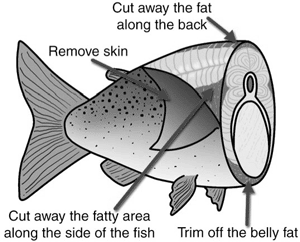|
||||
|
|
|
|||
| Home | Subscribe | Back Issues | The Organization | Volunteer | Do Something | ||||
|
||||
|
Safer Food Choices
How you can reduce toxins in foods for yourself and your family
from Washington Toxics CoalitionToxic chemicals such as mercury, dioxin, and PBDEs that remain in the environment for a long time build up in the fatty tissue of animals and fish, including those that people eat. Pesticides that are used in agriculture can remain on or in foods such as vegetables, fruits, and grains. Although it's impossible nowadays to totally avoid exposure to industrial toxins in food, below are five basic ways to reduce your intake of them.
Choose lean meat cuts, and buy organic meats if possible. Cut off visible fat before cooking meat and choose lower-fat cooking methods: broiling, grilling, roasting, or pressure-cooking. Avoid frying meat in lard, bacon grease, or butter.
Avoid bluefish, wild striped bass, American eel, spotted seatrout, marlin, king mackerel, shark, and swordfish. Women and children should not eat tilefish or tuna steaks, and should also limit their consumption of canned tuna. Safer seafood choices include wild salmon, sardines, anchovies, Atlantic herring, Dungeness crab, Pacific cod, Alaskan black cod, farmed striped bass, tilapia, farmed catfish, clams, mussels, and Pacific oysters. Check with state advisories before eating sport-caught fish or shellfish.
Here are some seafood information resources: Oceans Alive (Environmental Defense): Best and Worst Seafood (www.oceansalive.org/eat.cfm) Environmental Working Group: Mercury in Seafood (www.ewg.org/issues/mercury/index.php includes Tuna Calculator)
It's especially important to buy organically grown peaches, strawberries, apples, spinach, nectarines, celery, pears, cherries, potatoes, bell peppers, raspberries, and grapes (imported). These items typically contain the highest levels of pesticide residues. Also, wash produce well before preparing.
For more information on pesticides in produce, see: To see the full report "Pollution in People" about toxins present in the bodies of Washingtonians, see www.pollutioninpeople.org . |
|

